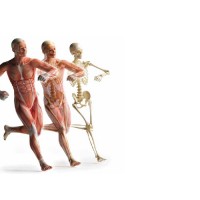Bone Health

Bone Health
Warning: Calcium Alone Will NOT Stop Osteoporosis
By Lorna R. Vanderhaeghe, MS
Our bones are constantly being broken down and rebuilt. Osteoporosis, meaning “porous bone,” arises when bone is broken down faster than it can be rebuilt. One in four women has osteoporosis and one in eight men. Bone fracture is a dangerous result of osteoporosis. Many people who have hip fractures as a result of osteoporosis never get out of long-term care facilities. And hip fractures result in death in up to 20 per cent of cases.
Bone is a matrix that contains not just bone-building minerals, but also collagen, which is the protein that makes our bones strong and malleable. If bone health were attainable with a simple calcium supplement, we would be seeing a reduction in the rates of osteoporosis as women are taking calcium supplements in record numbers. But osteoporosis rates remain high.
There is clearly more to strong bones than just calcium. Vitamin D3, for example, is essential to calcium absorption; unfortunately, research has shown that many people are deficient in this nutrient, particularly at northern latitudes and during the darker months of winter. Vitamin K2, meanwhile, guides calcium into bones and locks it in. Without enough vitamin K2, calcium can lodge in places that it is not supposed to, such as in the breasts, arteries and kidneys (kidney stones). Calcification causes hardening of the arteries and contributes to high blood pressure and calcium deposits in the breasts (breast calcifications lead to more diagnostic mammograms).
Vitamin K2 MK-7 and Bone Health
The “K” in vitamin K comes from the word koagulation. Vitamin K1 is a blood clotter and acts very differently than vitamin K2. Calcium in the bones and arteries is regulated by vitamin K2. Vitamin K2 is associated with osteoblasts. Osteoblasts are cells that build bone and produce a protein called osteocalcin. Osteocalcin ensures that calcium is incorporated into the bones. Without vitamin K2, osteocalcin cannot be produced in the body and proteins can’t hold onto calcium without enough vitamin K2. Vitamin K2 redirects calcium into bones where it should be.
Choosing the Right Type of Vitamin K2 [SUBTITLE]
Vitamin K2 (menaquinone MK-7) from the Japanese food natto is the most researched and best form of vitamin K2. Half of the vitamin K that our body absorbs is from green leafy vegetables. Unfortunately, most foods thought to be rich in vitamin K have less vitamin K than previously thought. Most multivitamins don’t even contain vitamin K and those that do don’t have enough. To prevent and treat osteoporosis, supplement with Vitamin K2 MK-7.
Vitamin D3 for Strong Bones
Another important bone vitamin is Vitamin D. Vitamin D is formed in the body by the sun’s rays on the skin, which then makes vitamin D3. As we age, our body is less efficient at making vitamin D, so you must take a vitamin D supplement. Like vitamin K2-MK7, vitamin D is essential for calcium absorption. A deficiency in vitamin D leads to decreased calcium absorption and increased excretion of calcium via the kidneys, promoting osteoporosis and other conditions such as osteoarthritis, muscle cramps and twitching, backache and tooth decay. It is important to choose the most active and powerful form of vitamin D, which is vitamin D3.
Vitamin D3 Better than D2
A December 2010 study in the Journal of Clinical Endocrinology and Metabolism reported that the two major forms of vitamin D, D2 (ergocalciferol) and D3 (cholecalciferol), are not absorbed by the body in the same way. In 33 healthy adults taking 50,000 IU of either vitamin D2 or D3 weekly for 12 weeks, blood vitamin D levels increased significantly more in the D3 group than in the D2 group. So make sure your vitamin D supplement is D3.
Collagen Bone Support
Yet another important component for your bones is collagen. Over one-quarter of all the protein in the body is made up of collagen. Collagen makes your bones, nails, teeth and hair strong. Collagen connective tissues run throughout the body and provide structure for your skeleton, tendons, cartilage and muscles, all of which support your internal organs and protect your softer tissues.
Silicon is a trace mineral required by the body to make collagen. Silicon is converted into silicic acid that the body then uses to manufacture collagen and elastin. Unfortunately, silicon from food and herbs is poorly absorbed, resulting in a lack of the building blocks required to make collagen. Silicic acid in supplement form, on the other hand, is used directly by the body to make collagen. Silicic acid is a fabulous bone booster. One study found that it can increase bone strength by two per cent over a one-year period. Not one study using calcium has shown this type of bone increase in such a short period of time. Receding gums are an early indicator of osteoporosis, and dentists have reported that supplementing with silicic acid stops receding gums.
Your Best Bone-Boosting Supplement Program
To build strong bones, combine an excellent calcium and magnesium supplement that contains the right forms of calcium such as aspartate, glycinate or citrate, with the right form of magnesium called magnesium bisglycinate, along with vitamin D3, vitamin K2 MK-7 and the collagen-builder silicic acid.

